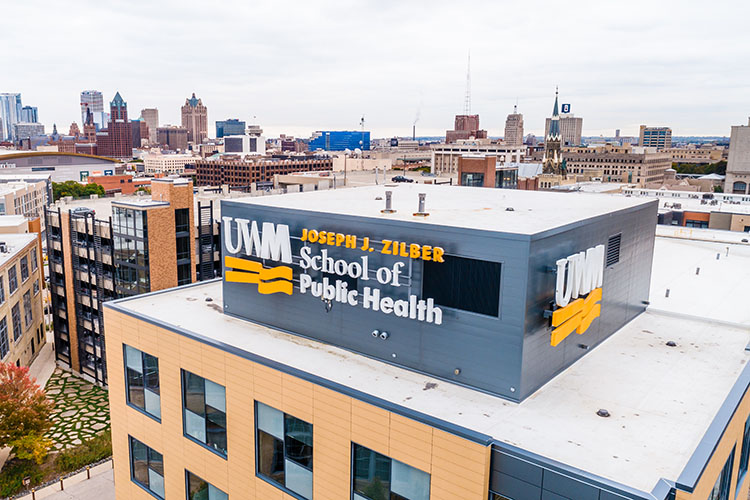By Devi Shastri
Milwaukee Journal Sentinel
July 12, 2023
A record-breaking $20 million gift to the Joseph J. Zilber College of Public Health, announced Wednesday by the University of Wisconsin-Milwaukee, will support faculty and research, create new student scholarships and further the college’s work to combat health disparities in Milwaukee and around the state.
The Zilber Family Foundation’s investment in Wisconsin’s only accredited school of public health will allow the college to invest in public health research and education like never before, leaders of the college and the foundation said. UWM’s College of Public Health is one of only 56 dedicated schools of public health in the country.
“I think this positions us to be a leading college of public health in the country, hands down,” UWM Chancellor Mark Mone said.
The gift is a continuation of the foundation’s support for UWM’s College of Public Health, which launched in 2007 with a $10 million gift from Joseph Zilber.
It also comes at a time when the work of public health experts ― and the challenges they face in doing that work ― are on the state and national stage like never before, from responding to the COVID-19 pandemic to moving the needle on deeply rooted societal and racial health inequities.
Stilp said the foundation chose to invest in the college again because of the great need for public health efforts to reduce health disparities in Milwaukee. The money will allow the college to recruit and retain the “best and brightest” faculty and students to find solutions for problems like childhood lead poisoning tied to the city’s old housing stock, she said.
“It’s an investment in an institution, but it’s really an investment in the community,” Stilp said.
Addressing health through access to safe housing is part of the original goals of the foundation, Stilp said. But it is just one of many public health issues that face the city and state.
Amy Harley, the college’s interim dean, said the college’s faculty brings expertise across a wide range of challenges, from air quality to opioid overdoses to premature births, all of which will benefit from the donation.
For example, the college has ongoing research on questions of how tobacco and e-cigarettes are marketed to young people on social media; what happens when municipalities declare racism a public health crisis; the health effects of algal toxins in the Great Lakes; and the importance of fatherhood in the health of families. During the COVID-19 pandemic, associate professor Lorraine Halinka Malcoe developed a partnership between the college and Milwaukee’s Black leaders to create a community-driven response to the disease.
Many of Milwaukee’s well-known inequities are driven by societal forces like income, access to fresh groceries and education, racism and more. Mone pointed to a study that found a nearly 12-year gap in life expectancy when comparing the relatively affluent 53217 ZIP code to the 53206 ZIP code, which is 8 miles away and where the median household income is $22,468.
“That’s a moral imperative,” Mone said of the findings in relation to the college’s public health work.
The $20 million will be split into two endowed funds: one to support faculty and another to support students.
On the student side, the gift will drive a “substantial stream” of scholarships which Mone said will grow enrollment and make UWM more attractive to top students.
As a condition of getting the gift, UWM and the UW System agreed to pay off the lease on the building in the Brewery District where the college is housed, ensuring the college has stable facilities for the future. The payoff would not use funds from the gift.
Stable funding should build on college’s growing success
It’s not common to see a donation of this size going to public health schools, Harley said, especially outside of the world of private universities.
But UWM’s College of Public Health has seen growing success and prestige in its 16 years. College leaders secured accreditation in a decade, added an undergraduate program to go with the initial graduate programming, and, as of July 1, reorganized to grow from a “school” to a “college” within UWM.
Now, the endowed gift will give the university stable funding that its leaders say will grow and support students and faculty for years and years to come. That long-term investment will be key, Harley and Stilp said, especially when considering the college’s work to admit and train public health professionals of the future.
Since 2009, the college has graduated 320 students who have logged nearly 65,000 placement hours working in the community. The Master of Public Health program boasts a 96% job placement rate and the doctoral program has a 100% placement rate. In fall 2022, the college enrolled 201 students in total.
UWM’s mission to educate Milwaukeeans and make pathways to college for first-generation students and non-traditional students was another reason why the foundation made the gift, Stilp said.
As is the case with UWM’s student body overall, many of the public health students, especially in the undergraduate program, come from the very populations that face the health inequities the college is working to address, Harley noted. Many are the first in their family to go to college, or are non-traditional students. The scholarships from the Zilber donation will help those who might run into financial barriers, Harley said.
“It does take sometimes different resources to provide access, and also success, to the students who we’re really looking to educate as the future public health workforce,” Harley said. “The ideal people to help with the solutions to some of these really complex problems are people that have seen those problems firsthand.”
Contact Devi Shastri at 414-224-2193 orDAShastri@jrn.com. Follow her on Twitter at@DeviShastri.
